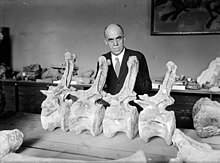Charles Gilmore
| Charles Whitney Gilmore | |
|---|---|

Charles W. Gilmore in 1924 with caudal vertebrae of Diplodocus longus
|
|
| Born | March 11, 1874 |
| Died | September 27, 1945 (aged 71) |
| Nationality | American |
| Occupation | Paleontologist |
| Employer | United States National Museum |
| Title | Curator of Vertebrate Paleontology |
Charles Whitney Gilmore (March 11, 1874 – September 27, 1945) was an American paleontologist who gained renown in the early 20th century for his work on vertebrate fossils during his career at the United States National Museum (now the National Museum of Natural History). Gilmore named many dinosaurs in North America and Mongolia, including the Cretaceous sauropod Alamosaurus, Alectrosaurus, Archaeornithomimus, Bactrosaurus, Brachyceratops, Chirostenotes, Mongolosaurus, Parrosaurus, Pinacosaurus, Styracosaurus and Thescelosaurus.
Gilmore was working as a paleontologist for the Carnegie Museum of Natural History in 1901 when he found the skeleton of a young sauropod, which was classified the following year as an Apatosaurus.
In 1903 Gilmore was hired by the United States National Museum (now the National Museum of Natural History), part of the Smithsonian Institution. His first assignment there was to work on the vast O. C. Marsh collection amassed during the Bone Wars; the fossils had been transferred from Yale University's new Peabody Museum of Natural History after the collection outgrew the smaller museum's storage capacity.
...
Wikipedia
